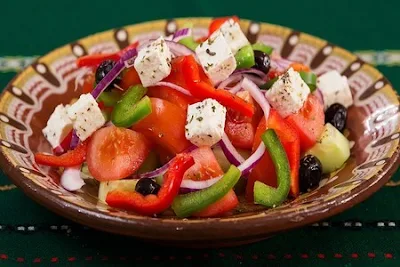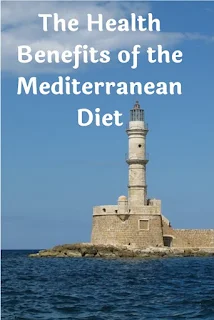Most of us have heard that the Mediterranean diet is good for our health. Yet most people don’t know why it is healthy for us. It is not only about olive oil and vegetables, but it is also about the combination of foods. You can easily incorporate parts of the Mediterranean diet into your daily meals.
A study reported in the June 2003 New England Journal of Medicine involved 22,043 adults in Greece and their diets. The study concluded that higher adherence to the Mediterranean diet was associated with a significant reduction in the mortality rate [1].
On the Greek Island of Crete, the people are 20% less likely to die of coronary heart disease than Americans and have a 33% less cancer than people in the US.
The Mediterranean diet is not a strict set of rules like weight loss diet plans you read about. It is the ingredients and more specifically the combination of these ingredients of the Mediterranean diet that is what makes it healthy.
The Mediterranean diet has it’s own food pyramid, which is based on the traditional way of eating in the 1960s from the Greek island of Crete and Southern Italy.
The important part of the study and the Mediterranean diet is that it is based on their traditional way of eating, before the onslaught of fast food restaurants.
Let's look at the individual parts of the Mediterranean diet and see what is healthy about those ingredients and how we can use them in our everyday diet.
The main healthy ingredients of the Mediterranean diet are plant foods, monounsaturated fats, fish and little meat. This a low-calorie diet and that makes it healthy, to begin with, and one of the healthiest diets.
The Foods of the Mediterranean Diet
The base of the pyramid starts with the foods that form the basis for every meal; fruits, vegetables, potatoes, whole grains, rice, beans, nuts, legumes, chickpeas, lentils, seeds, herbs, spices, and olive oil. These foods are high in every nutrient and the phytochemicals
we need to stay healthy and also high in fiber. A Mediterranean diet salad doesn’t have high-fat salad dressing; they have olive oil and vinegar.
Next up the pyramid is cheese and yogurt ranging from daily to once per week. Fish, eggs and poultry two times a week, no more than four eggs per week, and this includes using eggs in baking and cooking.
At the top of the Mediterranean diet, is meats (veal and lamb) and sweets eaten less often. Sometimes meat is only eaten once a month or only on special occasions. Yogurt is healthy for the digestive system and is a probiotic.
Olive oil, avocadoes, fish, nuts, canola, and peanut oils are the monounsaturated fats, which reduce the cholesterol in the blood, which can help the heart, reduce the risk of heart disease and lower blood pressure.
Arguments For and Against the Mediterranean Diet
There are arguments and confusion that the Mediterranean diet is full of fats and meat. Lamb is a part of the Greek or Mediterranean diet.
The difference is that they don’t eat two quarter-pounder lamb burgers with cheese and bacon at lunch and possibly again at dinner. They might eat lamb once a week or once a month.
Some like to argue that the diet is high in fat with cheese and yogurt. Feta is not like today’s wrapped slices of highly processed cheese.
Macaroni and cheese is not a healthy “old world” cheese. Feta has its good and bad points. The bad is it is high in fat; the good is that it is a great source of calcium, riboflavin, vitamin B12, and phosphorus.
The yogurt in the Mediterranean diet doesn’t contain the junk as today’s so-called healthy yogurt. Looking at a container of some popular yogurts today, you will see listed in the ingredients, sugar and high fructose corn syrup. There is nothing healthy about that. Try some Greek yogurt in recipes, on potatoes and by itself.
Desserts can taste very sweet but are made of fruits and many times honey or date paste replaces the use of refined sugar in recipes.
The main point to the Mediterranean diet is the large amounts of whole and fresh foods, and that means no processed foods or fast foods with all of the chemicals. When meat is included, it is usually a small portion as a side dish, not the main course. A lot of vegetables are eaten with Mediterranean meals.
Greek Salad Recipe
Here is one of my many favorites of the Mediterranean diet, the Greek salad.
2 to 3 large ripe tomatoes
½ onion red or Bermuda onion
1 cucumber peeled and diced
8 ounces of pitted Greek olives (kalamata olives)
3 to 4 ounces green olives
Garlic powder (not garlic salt)
Dry oregano
Olive oil
Juice of a ½ lemon
4 to 5 ounces of feta cheese crumbles
Dice the tomatoes and onions and olives. You can leave the olives whole if you like. Drizzle the olive oil over this and stir. Add the garlic powder, oregano, and lemon juice.
About the Author
Sam Montana is a certified Food Over Medicine instructor from the Wellness Forum Health Center and certified in optimal nutrition from the Harvard T.H. Chan School of Public Health.
Copyright © 2009-2019 Sam Montana

